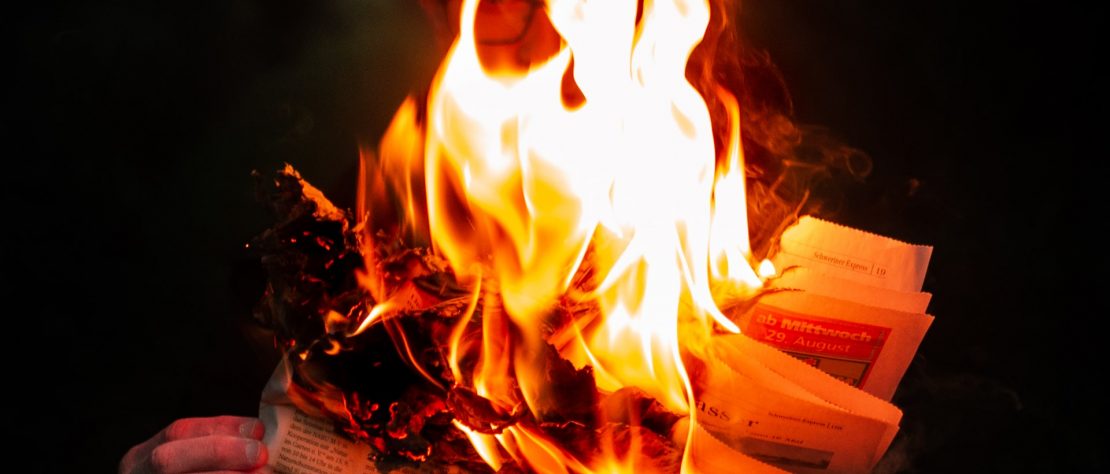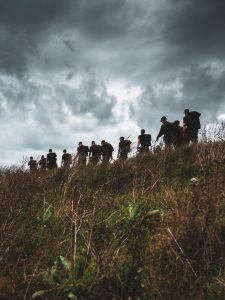
Trump’s August 2017 tweets of “Fire and fury”, “locked and loaded” lead me to think we are now at war with Eastasia. If you’re familiar with 1984, you will know that, of course, we have never been at war with Eurasia. Oh, hold on, “more troops to Afghanistan”… we are now at war with Eurasia, we have never been at war with Eastasia. When did the truth get lost in the mire of media bias, government censorship and propaganda, conspiracy theories, and fake news, all propagated virally by social media? With the ubiquity of movies, TV and YouTube so ingrained in people’s lives, there is little understanding of where fact and fiction separate. Is it Hollywood or Holyrood? Indeed, people have been served up such a gluttonous feast of sensational and fun videos for so long that anything which takes thinking about and effort to comprehend, or assimilate, has become anathema to us. Video is the new opiate of the masses.
Reporting of unbiased facts is not easy: even by omission, even by accident, no report is going to lead to, unequivocally, the ‘truth’. The scientific method of multiple peer review and an emphasis on elimination of control factors is the most successful attempt by humankind to produce analyses that equate to truth. But realistically it is limited to things that do not involve humans; people mess up control factors. Scientific results to do not advise on a course of action, which means that social policy, which must also be guided by ethics, and culture, needs to incorporate – or at least account for – elements of emotion, opinion and faith.
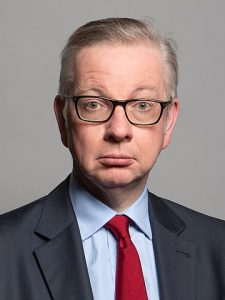 In an early draft of this blog, I was going to quote UK government cabinet minister Michael Gove from an interview he undertook during the campaigning for the Brexit referendum. He was widely reported to have said words to the effect that ‘people … have had enough of experts’ which would thoroughly and shamelessly reinforce my complaint above that people are uninterested in making the effort to understand details. As it turns out, Gove was only partially quoted, missing the point of his claim which was in fact much more reasonable. Whilst I believe that the misquote actually points to the truth of our fed-up society at the moment, the fact that Gove was vilified for (not) saying it thrusts at the heart of the problems of false news reporting. Incomplete data, given out of context … lies, damned lies and statistics.
In an early draft of this blog, I was going to quote UK government cabinet minister Michael Gove from an interview he undertook during the campaigning for the Brexit referendum. He was widely reported to have said words to the effect that ‘people … have had enough of experts’ which would thoroughly and shamelessly reinforce my complaint above that people are uninterested in making the effort to understand details. As it turns out, Gove was only partially quoted, missing the point of his claim which was in fact much more reasonable. Whilst I believe that the misquote actually points to the truth of our fed-up society at the moment, the fact that Gove was vilified for (not) saying it thrusts at the heart of the problems of false news reporting. Incomplete data, given out of context … lies, damned lies and statistics.
Given the lack of credible factual reportage in this post-truth era, what is the way to gain genuine knowledge and understanding of what is happening in the world? How do we sift through the history written by the victors in order to work out what actually went on?
I’d like to see the media take all manner of properly researched statistics and integrate them to give a balanced and factual picture of what is happening across all aspects of society. This lack of sensationalism would of course not be of interest to the majority of readers who lack the motivation to make the sustained effort to study things in such depth. So the media would lose viewers or readers, which are their lifeblood, and hence they don’t follow this approach. The best effort I have seen at this is the Moroccan daily newspaper Aujord’hui Le Maroc,  which I can’t recommend highly enough. It’s all facts and figures and unbiased information, and dull as dishwater – I love it! This approach is generally not going to be pursued by media corporations – the BBC is well placed to try but is too beholden to viewing figures than to the public service mission to pull this off to any significant extent. Thus, at the moment, being sufficiently well informed to take properly researched positions and decisions requires us to read/watch a wide range of sources reporting on the same thing. For something as simple as confirming the Gove quote, we are lucky that nowadays the internet allows us to simply review the original interview and see the truth. For more complex matters like the financing of public education, the range and depth of research needed is extensive. It would take a whole team of people, perhaps specially trained or experienced in the management of public education; something like a Department for Education, perhaps. Sorry, schoolteacher rant.
which I can’t recommend highly enough. It’s all facts and figures and unbiased information, and dull as dishwater – I love it! This approach is generally not going to be pursued by media corporations – the BBC is well placed to try but is too beholden to viewing figures than to the public service mission to pull this off to any significant extent. Thus, at the moment, being sufficiently well informed to take properly researched positions and decisions requires us to read/watch a wide range of sources reporting on the same thing. For something as simple as confirming the Gove quote, we are lucky that nowadays the internet allows us to simply review the original interview and see the truth. For more complex matters like the financing of public education, the range and depth of research needed is extensive. It would take a whole team of people, perhaps specially trained or experienced in the management of public education; something like a Department for Education, perhaps. Sorry, schoolteacher rant.
The production of reportage like this clearly should be the realm of government, the source of most of that actual, factual data, anyway. At least in the UK. And this does happen to some extent, although it too is becoming more ‘customer-focused’. In days gone by, governmental statistical reports were compiled deliberately in order to drive policy. Political dogma over the last generation has seen this significantly diluted such that the reports have a pre-determined policy aim to support, and so it feels these days that even government reports now lack real credibility.
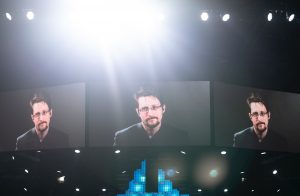
Now, combine the difficulty of believing in reported information with the deliberate obfuscation and propaganda propounded by those who seek to gain by the spread of disinformation, and the waters are really very muddy indeed. This has been countered to a limited extent by the likes of Wikileaks, Edward Snowden and the Panama Papers but, in isolation, these leaks expose only a limited amount of the unfair (and hypocritical) corrupt practices that are occurring. Thus far, what has been exposed has never been enough to create any real disturbance in those practices overall. Unless the entire global machine is exposed, the powerful can easily redirect their selfish energies away from each exposed practice, by developing new and different ways to hide their nefariousness.
If, and this is a pretty big if, action could be taken to oust the kleptocrats and corporate gangsters, should we be able to expose sufficient of their corrupt practices that they are left no place to hide, how are we going to arrange for that exposure? By their very nature, they keep their money laundering, lobbying, insider dealing and tax avoidance systems secret. In my new novel, 2089, I describe a hacker collective who realize that small-scale, Wikileaks-style releases of secret malpractice are insufficient. This group, calling themselves Bitness, spend years probing the servers of all governments and organisations that have influence over more than 10 million people. That means they include some local government organisations, like City Halls, government departments, and many, many businesses.
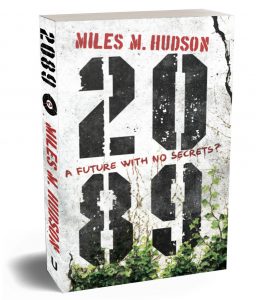 The story goes on to explain that when they expose all of this in one go, there is nowhere left to hide, and the people of the world unite in revolution. Well, that was the hoi polloi’s initial idea. It quickly nose-dives into smaller, local revolutions, which divide the outraged populace. Thus, when the riots have, pretty quickly, destroyed the infrastructure that supplied food, water and power, the masses turn to looting, banditry and internecine local civil wars. On an apocalyptic scale. The decade that followed the Bitness Revelations, the 2030s, came to be known as the Times of Malthus – war, famine, pestilence and death on an unprecedented, global scale. The intention to release the people from the shackles of their exploiters leads directly to the destruction of the population and our societies. Would it really be so?
The story goes on to explain that when they expose all of this in one go, there is nowhere left to hide, and the people of the world unite in revolution. Well, that was the hoi polloi’s initial idea. It quickly nose-dives into smaller, local revolutions, which divide the outraged populace. Thus, when the riots have, pretty quickly, destroyed the infrastructure that supplied food, water and power, the masses turn to looting, banditry and internecine local civil wars. On an apocalyptic scale. The decade that followed the Bitness Revelations, the 2030s, came to be known as the Times of Malthus – war, famine, pestilence and death on an unprecedented, global scale. The intention to release the people from the shackles of their exploiters leads directly to the destruction of the population and our societies. Would it really be so?
To paraphrase Jack Nicholson: can we handle the truth?
Main image credit: Photo by Julius Drost on Unsplash
